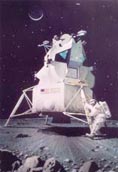|
It's Finally 1984
By Carlton W. Austin
Well, it may be late, but 1984 has finally arrived. If he's not turning over in his grave, at the very least George Orwell must be enjoying an I-told-you-so smile.
You see, on Friday, September 24, 1999, Space Imaging, Inc., a Colorado consortium led by Lockheed Martin, launched a new spy satellite. One with a difference. Whereas the products of Uncle Sam's current spies-in-the-sky are for use by defense and intelligence units of America and our allies--for, we suppose, our mutual defense--, images from this bird will be for sale to you and me and to anyone who can afford the nominal fees, which range from $20 to $300. (Current minimum order $1,000.)
The satellite, named Ikonos, will occupy an orbit 423 miles in space and can resolve images as small as one meter; that's about three feet. While this isn't as good as the military's Keyhole instruments, whose cameras are said to be able to check the color of your eyes, it's far better than anything available today from vendors in India, France, Russia or even the U. S.
Already, Space Imaging has $15 million in orders, and the service hasn't even started yet. Among that impressive backlog is this eager customer: The National Imagery and Mapping Agency, NIMA, the government shop that makes military maps and analyzes current top-secret satellite photos. They'll buy somewhere near $580 million worth over the next six years, according to a report in the Washington Post.
Except for Israel, which lobbied Congress two years ago to exempt it from the "open skies" policy that allows imaging the entire Earth's surface, we are all vulnerable to being eyeballed.
Ah, yes, I hear you saying, so what? Let the rest of the world have the capability. As long as our military SATs are better, we maintain superiority, right? We remain safe from our enemies. Hmmm . . . Wasn’t it Snoopy who said, "We have met the enemy, and he is us"? Isn't this exactly the kind of thing George had in mind when he coined the term Big Brother?
Yes, the world is a cold and dangerous place. And, true, this new capability will be a boon for human rights organizations, MIA groups and the like, who will have a new window on what's going on around the world. Not to mention that news organizations will no longer have to wait for the General's report; they'll make their own battle-damage assessments. But think about this: Now you can buy color pictures of your neighbor's new SUV, or even of your neighbor, as she lies naked by her pool, sunbathing. Okay, you'll have to be lucky to catch her at the right time; but with this thing zooming around the Earth 14 times a day in a sun-synchronous orbit, it can take a picture of any spot on Earth once every three days. Look out Mrs. Robinson!
To lipstick cameras, postage-stamp mikes and ladies named Tripp that gave new meaning to the word "trip-wire," add Ikonos, glowering overhead. It's a wonder people are so concerned about such trivialities as Internet use of "cookies" or shopping by credit card on the Web. After all, your liability for credit card charges you didn't make is only $50. (And your credit card information is at far higher risk every time you give it to the waiter in a restaurant.)
But imagine the psychic cost of having your private parts assayed photographically and offered for sale to the highest bidder on Ebay's auction site by your estranged--and deranged--ex-spouse. Makes you think, doesn't it? Next time you leave your house better make sure you wear your sunglasses, and for heaven's sake, make sure your tie is straight!
But Ikonos isn't the only thing you have to worry about. Big Brother has other new tricks up his sleeve. Consider the advertisement a company named TIME DOMAIN published recently in concert with the first International Ultra Wideband Conference, held in Washington, D.C., September 28-30. In it, TIME DOMAIN promotes a new microchip called PULSON that takes advantage of a technology generated by the Apollo program. (You'll be hearing a lot more about this technology and this company in the future, both here and elsewhere.)
Known as "radio pulse," the technology allows "...huge amounts of data [to be] transmitted without interfering with other radio frequencies, creating amazing new possibilities in low-cost voice and data communications, personal radar and precise positioning." (Italics added.)
The company has actually produced a hand-held radar unit that can see through walls, ostensibly to allow police to scope out a room before barging in (you do have a warrant, don't you, officer?), or perhaps to allow firefighters to do the same in a burning building, thus preventing them from being put at risk unnecessarily. These are laudable uses. But how long will it take before X-ray-vision glasses, like those that used to be advertised in the back of Popular Mechanics, become a reality? If we're all going to be Superman, you'd better stock up on your Kryptonite now! (The company also boasts the ability to track the "...precise location of people, shipments and assets...within an inch.")
So will Friday, September 24, 1999, be remembered as the day we all got access to cheap pictures from space? Or will it be remembered as the day 1984 finally arrived? -- C. W. Austin
Editor’s note, May 2013.... If you think that this was just a tad prophetic, having been written in 1999, then you should definitely read this:
Where might all this be leading? A dystopian preview is presented in this excerpt from my novel, Second Eden. Written over 20 years ago, it may prove to have been prophetic. Here the male protagonist, Peter MacKenzie, is allowed to view--remember--his past existence on Mars:
 “Where am I?” he blurted out loud. There was no response, and suddenly he realized: This was no film! These were his memories, which he now relived with a supernatural detachment, both as spectator and participant: He felt every searing emotion, saw every sight, heard every sound, savored every taste, delighted—or recoiled from—every tingling or lacerating touch. Memories long buried, not just from his current life’s unconscious archives but from the shadowy long, long ago, resurrected themselves with an immediacy, a heart-known reality that left no doubt as to their authenticity. Events replayed at high velocity. In this dimension, time had no meaning; events did not succeed events but overlapped, layer upon layer, allowing everything to be experienced at once yet with a distinct separateness. “Where am I?” he blurted out loud. There was no response, and suddenly he realized: This was no film! These were his memories, which he now relived with a supernatural detachment, both as spectator and participant: He felt every searing emotion, saw every sight, heard every sound, savored every taste, delighted—or recoiled from—every tingling or lacerating touch. Memories long buried, not just from his current life’s unconscious archives but from the shadowy long, long ago, resurrected themselves with an immediacy, a heart-known reality that left no doubt as to their authenticity. Events replayed at high velocity. In this dimension, time had no meaning; events did not succeed events but overlapped, layer upon layer, allowing everything to be experienced at once yet with a distinct separateness.
First he saw a surpassingly beautiful planet as viewed from space, a planet not unlike Earth—but not Earth. Breathless blue oceans reflected crystalline skies; fluttering clouds hovered like guardian angels over emerald continents.
Suddenly, he zoomed downward to the planet’s surface, where life, with its boundless expression of variety, swarmed about him. There, towering mountains surveyed happy rivers, hills and valleys, all studded with prim villages, bustling with life, human life. He remembered this place. Home. Mars!
With dizzying speed, images upon images poured forth, bathing him in every imaginable emotion. Now he remembered, felt, lived the harmony of the early ages, days in which he and all humans were of a single kind, alike in every respect—no races, no ethnicity. All were physically as well as spiritually pure. All knew it, knew the legacy of their brotherhood and sisterhood—their oneness of spirit. Their purpose was plain and pure: They lived to learn and grow, their bodies providing the vehicle, the opportunity. Spiritual advancement came through discipline and mastery of the challenges of the flesh. All life was a sacred trust, to be husbanded, cultivated, and only judiciously used. For then as now death marked the end of life’s chapters, but there was understanding of its timeless role in creation, growth and renewal.
Events fast-forwarded. Overwhelmed, he sickened from the rush, struggled to swim against the raging currents of timeless memory, but could not stop the flow nor blunt the dismaying emotions.
Zooming outward for a broader view, he saw many cities, like gargantuan anthills, swarming with the varied racial forms he knew from Earth. Now he saw—was living in—a great city. Images blurred, blended, merged and then refocused. In rapid succession he read a litany of newspaper headlines proclaiming the great discoveries of those days in genetics and heard the boastful pride of the scientists who had produced the races through genetic tampering in their heady quest for power, the power to create as the Creator had created. He felt their hubris, felt his own. But the power to create new sentient forms became a power of tyranny. Their differences now divided them, pitted one against the other, and the beautiful existence they had known together on Mars began to putrefy like a rotting carcass.
And a subtler change crept insidiously into their life ethic. Controlling the lusts of their own animal nature, formerly a mark of high accomplishment, gave way to a new ethic of hedonism, then unchained animalism. Timeless tradition and its supporting rituals—including those for marriage of men and women, within whose covenants the judicious nurturing of children could be effected—were discarded in a willing slavery to all animal urges.
Breeding programs that produced the races yielded other bitter fruit: chimeras, forms of beastly countenance and vicious disposition that roamed the lands spreading havoc. Ultimately, breeding without restraint produced too many bodies for those of proper spiritual attainment and rank to occupy. But the living vessels had to be filled. So, according to higher law, less accomplished spirits awaiting stations as different forms, on other planets, were forced to occupy the surplus forms. Unprepared for the challenge, they added to the friction among the peoples whose collective temperature rose to an ever higher degree. Nation fell against nation. A horrid estrangement overtook them as they wandered farther and farther from their path, their purpose. They had forgotten who they were. Oh, yes! The emotion came clear, the memory pure: losing humility was nothing compared to this: They had outsmarted themselves and lost their identity! Forgetting their spiritual nature, they worshipped the vessel rather than the divine nectar it contained.
Fast-forward again, at blurring, nauseating speeds. But suddenly something had changed. He was back on Earth. Present day. He shuddered. Some laughing, wicked presence accompanied him, and he felt impending calamity. Another image superimposed itself: the pulsating, bulging, frightened eyes of Bliss as Peter’s hands closed fiercely around his throat. What’s this?
Before he had time to consider further, like a yo-yo, he snapped back to the past on Mars.
Creating a world ruled by computers, they lived digital lives of perpetual electronic delusion, isolated by hatred and mistrust, cloistered, pathetic lives, avoiding face-to-face relationships, preferring instead to live off images, digitally created, malleable, mutable, lying images. Their estrangement was complete, from each other and from themselves. Actions became disengaged from effect, for who ever knew if any result was real? Allying themselves according to skin color, knowledge of technical exotica, sexual orientation, or idiosyncratic ideologies, they formed groups with the characteristics of primitive tribes, further splintering the structure of a magnificent civilization. Denying the congeniality of the common good, they fought endless, useless wars. [Italics added]
Martian Potentates no one had ever seen in the flesh, and who may never have existed—except as illusory fictional personas, arrays of electrons—ruled their lives. Finally, they lost the ability to know truth. And with it, they lost the knowledge of their divineness and its greatest gift—the gift of individual free will. Dangerous spiritual renegades, abnegating responsibility, denying agency, forgetting ultimate accountability, they lived a miserable animal existence. Wars of surpassing violence ensued, and with them war’s cohorts: pestilence, famine, plague.
Suddenly, his very soul was shaken to the core by an enormous explosion. One horrible supernova image, all brilliant and colorful light, consumed him—everyone!—with a terrifying emotion, as a final, screaming conflagration ripped the atmosphere from his beautiful home, Mars, stealing forever her grandeur, and leaving them all homeless.... 
Link
|

 “Where am I?” he blurted out loud. There was no response, and suddenly he realized: This was no film! These were his memories, which he now relived with a supernatural detachment, both as spectator and participant: He felt every searing emotion, saw every sight, heard every sound, savored every taste, delighted—or recoiled from—every tingling or lacerating touch. Memories long buried, not just from his current life’s unconscious archives but from the shadowy long, long ago, resurrected themselves with an immediacy, a heart-known reality that left no doubt as to their authenticity. Events replayed at high velocity. In this dimension, time had no meaning; events did not succeed events but overlapped, layer upon layer, allowing everything to be experienced at once yet with a distinct separateness.
“Where am I?” he blurted out loud. There was no response, and suddenly he realized: This was no film! These were his memories, which he now relived with a supernatural detachment, both as spectator and participant: He felt every searing emotion, saw every sight, heard every sound, savored every taste, delighted—or recoiled from—every tingling or lacerating touch. Memories long buried, not just from his current life’s unconscious archives but from the shadowy long, long ago, resurrected themselves with an immediacy, a heart-known reality that left no doubt as to their authenticity. Events replayed at high velocity. In this dimension, time had no meaning; events did not succeed events but overlapped, layer upon layer, allowing everything to be experienced at once yet with a distinct separateness.


